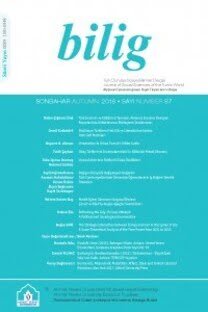Türkiye'de Ulus-Devlet Formasyonunun Ortaya Çıkış Sürecini Habitus Kavramı Üzerinden Okumak
Reading The Emergence of Turkish Nation-State Through the Concept of Habitus
___
Açıkel, Fethi (1996). "Kutsal Mazlumluğun Psikopatolojisi". Toplum ve Bilim 70: 153-196._____ (2002). "Devletin Manevi Şahsiyeti ve Ulusun Pedagojisi". Ed. Tanıl Bora. Modern Türkiye'de Siyasi Düşünce: Milliyetçilik. İstanbul: İletişim Yay. 117-139.
Ahmad, Feroz (1999). Modern Türkiye'nin Oluşumu. İstanbul: Kaynak Yay.
Anderson, Benedict (1995). Hayali Cemaatler. Çev. İ. Savaşır. İstanbul: Metis Yay.
Billig, Michael (1995). Banal Nationalism. London: Sage.
Blackledge, Adrian (2004). "Constuctions of Identity in Political Discourse in Multilingual Britain". Eds. Anita Pavlenko ve Adrian Blackledge. Negotia- tion of Identities in Multilingual Contexts. Bristol: Multilingual Matters Limited. 68-92.
Bourdieu, Pierre (1990). In Other Words. Cambridge: Polity Press.
_____ (1991). Language and Symbolic Power. Cambridge: Harvard University Press.
_____ (1994). Distinction: A Social Critique of the Judgement of Taste. Çev. R. Nice. London: Routledge.
_____ (1998). Practical Reason. California: Stanford University Press.
_____ ve Loic Wacquant (2003). Düşünümsel Bir Antropoloji İçin Cevaplar. Çev. N. Ökten. İstanbul: İletişim Yay.
Breuilly, John (1994). Nationalism and The State. Manchester: Manchester Uni- versity Press.
Burke, Peter (1992). "We, the people". Modernity and Identity. Oxford: Black- well.
Bora, Tanıl (1999). Türk Sağının Üç Hali. İstanbul: Birikim Yay.
Canefe, Nergis (2002). "Turkish Nationalism and The Ethno Symbolic Analysis: The Rules of Exception". Nations and Nationalism 8(2): 133-155.
Danahay, Deborah (2004). Locating Bourdieu. Indiana: Indiana University Press.
Delanty, Gerard ve Patrick O'Mahony (2002). Nationalism and Social Theory. London: Sage.
Dunning, Eric ve Stephen Mennell (1997). "Preface". Norbert Elias. The Ger- mans. Cambridge: Polity Press. i-xxv.
Eagleton, Terry (1994). "Ideology and Its Vicissitudes in Western Marxism". Ed. Slavoj Zizek. Mapping Ideology. London: Verso. 179-226.
Elias, Norbert (1997). The Germans: Power Struggles and The Development of Habitus in the Nineteenth and Twentieth Centuries. Translated by. E.Dunning-S.Mennell. Cambridge: Polity Press.
_____ (2001a). Uygarlık Süreci, Batılı Dünyevi Üst Tabakaların Davranışlarındaki Değişmeler. Çev. E. Ateşman. C. 1. İstanbul: İletişim Yay.
_____ (2001b). The Society of Individuals. New York: Continuum.
Featherstone, Mike (2002). "Post-national Flows, Identity and Culture". Eds. Eliezer Ben-Rafael ve Yitzhak Stenberg. Identity, Culture and Globaliza- tion. Leiden: Brill. 483-526.
Foucault, Michel (2000). "Yönetimsellik". Entelektüelin Siyasi İşlevi. Çev. F. Keskin-O.Akınhay. İstanbul: Ayrıntı Yay.
Gurallar, Neşe (2009). "Ankara Bakanlıklar Üçgeninin Şekillenişi". Toplumsal Tarih 187: 66-72.
Gürbilek, Nurdan (2000). "Acıların Çocuğu". Defter 14 (40): 85-106.
İnsel, Ahmet (1995). Türkiye Toplumunun Bunalımı. İstanbul: Birikim Yay.
Jay, Richard (1994). "Nationalism". Ed. Richard Eccleshall. Political Ideologies. New York: Routledge. 153-184.
Jenkins, Richard (1992). Pierre Bourdieu. London: Routledge.
Kadıoğlu, Ayşe (1996). "The Paradox of Turkish Nationalism and the Construc- tion of Official Identity". Ed. Sylvia Kedourie. Turkey: Identity, Democra- cy, Politics. London: Routledge. 177-193.
Kansu, Aykut (2009). "Bahçeli Evler Yapı Kooperatifi: 1943-1939". Toplumsal Tarih 187: 54-65.
Kedourie, Elie (1994). Nationalism. Oxford: Blackwell.
Kohn, Hans (1960). The Idea of Nationalism. New York: The MacMillan Company.
Kord, Susanne (2007). "The Pre-Colonial Imagination: Race and Revolution in Literature of Napoleonic Period". Ed. Mary Fulbrook. Un-Civilizing Processes?: Excess and Transgression in German Society and Culture: Perspec- tives Debating with Norbert Elias. Amsterdam: Rodopi. 85-116.
Kushner, David (1979). Türk Milliyetçiliğinin Doğuşu. İstanbul: Kervan Yay.
Kuzmics, Helmut ve Roland Axtmann (2007). Authority, State and National Character. Surrey: Ashgate.
Loyal, Steven (2004). "Elias On Class And Stratification". The Sociology of Nor- bert Elias Eds. S. Loyal ve S. Quilley. Cambridge: Cambridge University Press. 122-141.
Mardin, Şerif (2003). "Türk Siyasasını Açıklayabilecek Bir Anahtar: Merkez- Çevre İlişkileri". Türkiye'de Toplum ve Siyaset. İstanbul: İletişim Yay. 35-78.
Miller, David (1991). "Nationalism". The Blackwell Encyclopedia of Political Thought. Oxford: Blackwell. 351-354.
_____ (1999). On Nationality. Oxford: Oxford Press
Moore Jr, Barrington (1989). Diktatörlüğün ve Demokrasinin Toplumsal Kökenleri: Çağdaş Dünyanın Yaratılmasında Soylunun ve Köylünün Rolü. Çev. A. Şenel-Ş. Tekeli. Ankara:Verso Yay.
Mottier, Veronique (2002). "Masculine Domination: Gender and Power in Bourdieu's Writings". Feminist Theory 3 (3): 345-359.
Pickel, Andreas (2004). "Homo Nationis: The Psycho-social Infrastructure of the Nation-state Order". Global Society 18 (4): 325-346.
_____ (2005). "The Habitus Process: A Biopsychosocial Conception". Journal for the Theory of Social Behaviour 35 (4): 437- 461.
Shils, Edward (1975). "Center and Periphery", Center and Periphery: Essays in Macrosociology. Chicago: the University of Chicago Press.
Smith, Anthony D. (1992). Myth and Memories of the Nation. Oxford: Oxford University Press.
_____ (1999). The Ethnic Origins of Nations. Oxford: Oxford University Press .
Smith, Dennis (2001). Norbert Elias and Modern Social Theory. London: Sage.
Swartz, David (1997). Culture and Power: The Sociology of Pierre Bourdieu. Chica- go: The University of Chicago Press.
Thompson, Edward P. (1980). The Making of the English Working Class. Vancou- ver: Vintage.
Tilly, Charles (2000). Avrupa'da Devrimler: 1492-1992. Çev. Ö. Arıkan. İstanbul: Yeni Binyıl Yay.
Trimberger, Ellen K. (1999). "E.P. Thompson: Tarihin Sürecini Ayarlamak". Ed. T. Skocpol. Tarihsel Sosyoloji. İstanbul: Tarih Vakfı Yurt Yay. 210-243.
Uluiş, Levent (2009). "Lörcher'in Ankara'sı: Anti-Modernist ve Otoriter Eğilimleri Yansıtan Bir Şehir Tahayyülü". Toplumsal Tarih 187: 73-82.
Ünüvar, Kerem (2001). "İhya'dan İnşa'ya". Ed. Mehmet Alkan. Tanzimat ve Meşrutiyet'in Birikimi. İstanbul: İletişim Yay. 129-142.
Van der Velde, Martin ve Hank van Outum (2004). "De-politicizing Labour Market Indifference and Immobility In The European Union". Ed. Barba- ra Hooper. Cross-Border Governance in the European Union. London: Routledge. 41-55.
Vann, Robert (2000). "An Empirical Perspective On Practice: Operationalising Bourdieu's Notions of Linguistic Habitus". Ed. Derek Robbins. Pierre Bourdieu. C. IV . London: Sage. 73-82.
Van Krieken, Robert (1998). Norbert Elias. London: Routledge.
Zürcher, Erik-Jan (2000). Modernleşen Türkiye'nin Tarihi. Çev. Y. S. Gönen. İstanbul: İletişim Yay.
- ISSN: 1301-0549
- Yayın Aralığı: 4
- Başlangıç: 1996
- Yayıncı: Ahmet Yesevi Üniversitesi Mütevelli Heyet Başkanlığı
Modernleşme döneminde bir kadın yazarın portresi: Emine Semiye Hanım
İşgal Döneminde İstanbul ve Gelibolu'da Bolşevik Aleyhtarı Wrangel Ordusu
Atatürk Döneminde Sovyet Tarımını İnceleme: Resmî Geziler ve Bilimsel İşbirliği (1925-1932)
Türkiye'de Ulus-Devlet Formasyonunun Ortaya Çıkış Sürecini Habitus Kavramı Üzerinden Okumak
Osmanlıya gelen Kırım ve Kafkasya göçmenlerinin sorunları
Anadolu'da İlk Türkçe Telif Eser
Etnomüzikoloji açısından Ahmed Adnan Saygun
Doppelgänger in Orhan Pamuk’s the black book
Türk ve Moğol kavimleri arasında Kırgızların demografik-etnik erime seyirleri
